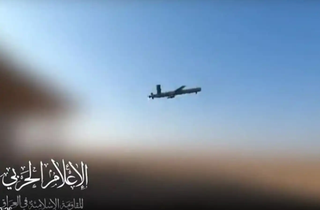The Israeli strikes on al-Mawasi on Saturday resulted in the deaths of at least 90 Palestinians and injuries to hundreds more. This incident has drawn widespread international condemnation and prompted a proactive response from members of the Axis of Resistance, including the Yemeni Armed Forces and the Iraqi Resistance.
In response, the Islamic Resistance escalated its operations against the Israeli occupation. According to local sources, early on Monday, the group carried out two operations using suicide drones against distinct targets, followed by a third operation utilizing locally-developed al-Arqab cruise missiles.
Kataib Hezbollah, a member of the Iraqi Resistance, had earlier condemned the attacks and promised retaliation. The group stressed that the Israeli occupation "only understands the language of war," necessitating an increase in operations by members of the Axis of Resistance. Additionally, Iraqi Resistance factions accused the United States of facilitating the Israeli genocide on Gaza.
"The United States is participating in the killing of the Palestinian people by supporting the Zionists and supplying them with thousands of tons of bombs to commit massacres," stated Kataib Hezbollah.
Later on Monday, the Iraqi Resistance announced that it had attacked occupied Umm al-Rashrash (Eilat) and the occupied Haifa Port using several drones and a cruise missile.
The Israeli attack on al-Mawasi, purportedly targeting leaders of the al-Qassam Brigades, resulted in the deaths and injuries of around 350 Palestinians, predominantly women and children. Despite the strikes, Israeli Chief-of-Staff Herzi Halevi admitted that Israeli intelligence could not confirm whether al-Qassam's leader, Mohammad Deif, was killed.
The international community, including regional governments and the United Nations (UN), condemned the Israeli strikes for their disregard for civilian lives. UN Secretary-General Antonio Guterres expressed his shock and sadness over the al-Mawasi attack, emphasizing the need for adherence to "international humanitarian law, including the principles of distinction, proportionality, and precautions in attack" at all times. (ILKHA)



 Güncel
Güncel
 Güncel
Güncel
 Eğitim
Eğitim
 Dünya
Dünya
 Güncel
Güncel
 Güncel
Güncel
 Dünya
Dünya
 Güncel
Güncel
 Dünya
Dünya
 Dünya
Dünya





